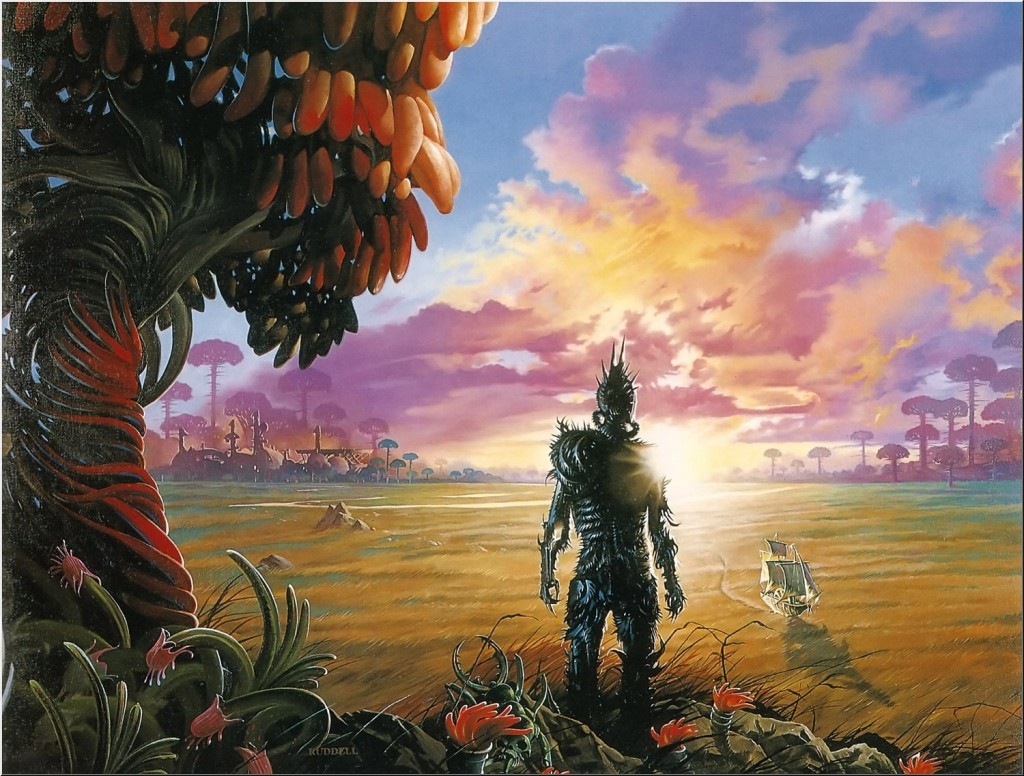Hyperion

“In the beginning was the Word. Then came the fucking word processor. Then came the thought processor. Then came the death of literature. And so it goes.”
Book Presentation
Hyperion is Hugo Award winning book by Dan Simmons published in 1989. It is a frame story book or other words, it is a collection of multiple independent stories told within a greater story.
In Hyperion, the Earth was lost due to the Big Mistake (creation of a black hole in Russia which tore apart the Earth) and humans colonized hundred of planets and split into multiple factions.
The biggest of them (The Hegemony) unified most of the worlds into the WorldWeb, a series of worlds connected via farcasters allowing instant travel between them so that one of the rivers for example, flows on all of the worlds of the Hegemony, with each segment being located between two farcaster portals.
The story speaks of the last seven pilgrims making a pilgrimage toward the Time Tombs (old artefacts not built by humanity) as they are about to open on the non-connected backward world Hyperion, where they hope to meet the mystical killing machine called The Shrike, a tall being made of metal with 4 arms covered in blades and razor blades which normally is only made for killing. All while the enemies of the Hegemony, nicknamed the Ousters, are about to attack and possibly raze Hyperion.
When a prime number of pilgrims make it to the Time Tombs, the Shrike, according to legend, listens to their wish, grants one and kills the other pilgrims whose wish was denied.
On the way to the Time Tombs, the seven last pilgrim decide to tell their individual tales so that with the shared knowledge of why they are on the pilgrimage, they might have more information on how to survive the confrontation with the Shrike.
As a result, as the 7 pilgrims travel in the fascinating Hyperion wilderness, we hear the tale of one of the last catholic Priests who came to Hyperion some years before to save a colleague and reads from that colleague’s diary, we learn how one of the most decorated colonels came to fight along side the Shrike on Hyperion several years before that after a fight with the Ousters, we also learn of the last fate of the Earth and the early colonization of Hyperion by a poet.
We also learn about why the elderly Jewish scholar decided to bring his infant child on such a deadly mission and the tragic story of his daughter who suffers from the Merlin sickness and now ages in reverse, since she meant the Shrike in one of the time tombs. Sadly, after his story, the templar disappears so we fail to hear his story.
We also hear the tale of Brawne Lamia, the only female adult of the group, who is a private investigator with interesting information on the Technocore, the AI group which seceded from humanity. We end the stories with the former consul of Hyperion who tells the story of Siri, the woman who instigated a rebellion quite a few years ago on the world of Maui covenant, adding his own footnotes and recent activities.
The book ends with the group reaching the valley of the time tombs.
Critical Review
I had read Hyperion back in 1991 or 1992 and until now, this has been one of the books I had been the most divided upon. On one hand, the book is clearly a masterpiece of science-fiction: the themes are exciting and original and the universe it is set upon is one of the most diverse I have ever seen, despite the obvious lack of aliens (apart from the world of Hyperion).
Most sci-fi authors introduce a single or perhaps two new concepts in their books, but Dan Simmons goes for the total: Facasters, Thought processors, Treeships, fugue state, ousters, labyrinthine worlds, the Technocore, the hegemony, the Time Tombs, the Shrike, anti-entropic fields, Merlin disease, the Hawking Drive, the cruciform, time debts, the AllThings and so many others the books might feel intimidating.
But it’s not. As explained above, the book is told in 6 stories made by the pilgrims each exploring only some of the facets of the universe so that you only take in part of the world at a time. The ending was seriously too abrupt and didn’t solve much, but not all of the books have a proper ending so I tried not to be judgmental.
And yet, I hated the extremely soft sci-fi in which most of the various aspects seemed eccentric only for the purpose of making the story interesting. As if the author wanted a great sci-fi book so he crammed as many mysteries so that people would marvel at his creativity.
Granted, it didn’t feel like that, but once I was done, I was left with my appetite… and I was right to, for the Hyperion Cantos isn’t told in a single book, but rather in 4 distinct volumes and the remaining 3 apparently reveal the secrets to the mysteries of the first rather than just continuing on expanding them. If I had only known then that sequels were upcoming and that the direct sequel, Fall of Hyperion was already available. As it turns out, I am currently listening to that sequel so expect a review in August 2015’s edition of Preßeu Zespenat
My biggest remaining problem is that many of the stories told within the story are actually told by an absent narrator and as a result, they do not feel like a discussion among the pilgrim but rather like a collection of independent short stories stitched together in a novel. For example, one of the pilgrims might reveal something pivotal to the story of another and yet, we do not see the reaction of that other character. Or one of the characters reveals a major hidden secret which would cause the other 5 (or 6) to gasp and react and nothing is shown.
As for my initial impression that the book’s setting was made complex just for the purpose of having a complex story? It is already partly redeemed in the first few chapters of the sequel and I read spoilers indicating to me that perhaps, my impression was completely wrong and everything will be explained in due time.
The Audio book however, shines over the book by having not a single, but rather 5 readers so that each section has it’s own voice and tone. For example, the reader playing the Poet read his part in a funny drunken tone which makes it much more alive than the other parts of the story. Of course, the readers who play a part in the stories also play them in the interludes between them so that it feels as though we have a full cast even if a few play multiple roles (or one plays all of the other characters? Sadly, I didn’t find an actual voice distribution per character).
In short, I highly recommend it, even if it ends abruptly… but make sure you have access to the sequels!
